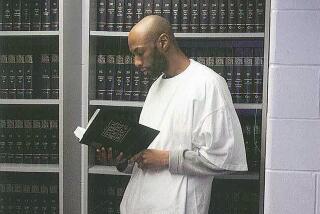U.S. charges Australian with war crime
- Share via
MIAMI — The Pentagon filed a war crimes charge against Australian David Hicks on Thursday, making the former kangaroo skinner the first target of new military commissions designed by the White House and endorsed by Congress to try terrorism suspects imprisoned at Guantanamo Bay.
The indictment charges Hicks with a single count of providing material support for terrorism, dropping an accusation of attempted murder proposed by the chief prosecutor a month ago, when the charges were drafted for consideration through a complex judicial chain of command.
The revised charge was approved by the commissions’ newly appointed convening authority, Susan J. Crawford, a 30-year Pentagon legal veteran who serves as a sort of attorney general for the commissions.
The charge against Hicks followed by five days a visit to Australia by Vice President Dick Cheney, who was urged by Prime Minister John Howard and other politicians to end Hicks’ five-year legal limbo.
Hicks, 31, has become a political liability for the Canberra government because Australians, like most allies in the war on terrorism, consider the Bush administration’s practice of jailing suspects indefinitely without charges a human rights violation.
Howard, facing an election this year, told Cheney he wanted Hicks’ case “brought on as soon as humanly possible and that there be no further delay.”
Cheney told reporters that the Australian detainee was “near the head of the queue” of detainees to get his day in court.
On Monday, Hicks’ civilian attorneys went to the Federal Court of Australia in a bid to force that government to demand that the detainee be brought home to face trial. They accused Australian officials of failing to assist a citizen overseas. Justice Brian Tamberlin said Wednesday that he would rule later on whether the court had jurisdiction in the matter.
European governments demanded custody two years ago of their citizens detained at Guantanamo, and all have since been transferred to their home countries. In all, 390 onetime prisoners have been transferred or released, including two men sent to Afghanistan and three to Tajikistan in departures announced Thursday.
According to the procedure set up by the military commissions, Crawford was obliged to refer charges to military commissions for trial if they met three criteria: that there are reasonable grounds to believe an offense has been committed, that the accused committed it, and that the charge specifies an offense, said Navy Cmdr. Jeffrey D. Gordon, a Pentagon spokesman.
In the case of the chief prosecutor’s recommendation of an attempted murder charge against Hicks, “She didn’t obviously think either No. 1 or No. 2” applied, Gordon said.
Crawford took up her post as convening authority two weeks ago. She may bring fresh eyes and deeper scrutiny to the new version of the tribunals launched last fall with Congress’ passage of the Military Commissions Act.
Hicks’ military defense lawyer, Marine Maj. Michael Mori, said the support-for-terrorism charge never existed in the previous laws of war.
Omitting the attempted murder charge, Mori added, was “an admission by the U.S. that there was no basis for the original charges and that the U.S. had no justification to hold David for five years on those made-up offenses.”
Charges also have been drafted against two other detainees from among the 385 still at Guantanamo.
Crawford is also reviewing charges prepared by Air Force Col. Morris Davis, the chief prosecutor, against Canadian Omar Khadr, who was 15 when he was captured in Afghanistan, and Salim Ahmed Hamdan of Yemen.
Hamdan, a former driver for Osama bin Laden, had challenged his detention in U.S. civilian courts, leading to the June decision by the U.S. Supreme Court to strike down the previous military tribunals as unconstitutional.
Legal scholars and human rights advocates observed that none of the 14 so-called “high-value” detainees transferred from secret CIA prisons to Guantanamo in September had been charged under the commissions.
“By charging someone who is not a high-value detainee, maybe they want to work out the kinks in the system,” Jumana Musa, international justice advocate for Amnesty International USA, said of the Pentagon’s selection of Hicks as its first defendant.
“One big issue is that the validity of these commissions is still unclear,” noted University of Richmond law professor Carl Tobias, who tracks anti-terrorism legislation and policy. He questioned why the military was moving forward with the tribunals when their legitimacy had yet to be validated by U.S. federal courts.
Davis, the military prosecutor, has said he expects eventually to bring charges against about 75 of the prisoners. An additional 85 have been cleared by annual review boards for transfer to their home countries, leaving more than 200 likely to remain indefinitely in a state of legal paralysis.
Hicks was captured by Afghanistan’s Northern Alliance fighters in December 2001, turned over to U.S. forces and flown to Guantanamo in January 2002.
The Australian convert to Islam was one of the 10 Guantanamo prisoners charged with war crimes before the previous tribunals were deemed an unlawful excess of executive power. Hicks pleaded not guilty to the previous charges of conspiracy, attempted murder and aiding the enemy.
Hicks must be arraigned within 30 days of being served the charges in person. Trials must begin within 120 days of serving charges, so Hicks may be before the jury-like commission by late June or July.
More to Read
Sign up for Essential California
The most important California stories and recommendations in your inbox every morning.
You may occasionally receive promotional content from the Los Angeles Times.














